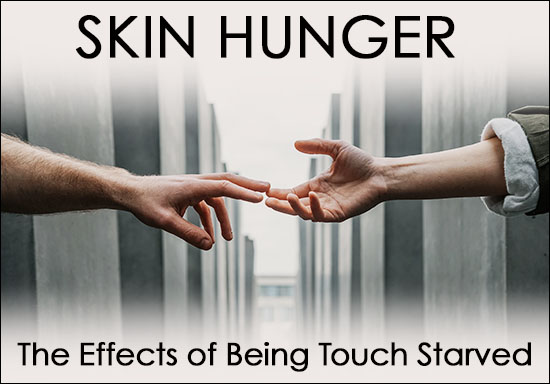
Human beings desire to be touched. The desire to feel others touch makes us human. From birth until the day we die, the need for skin to skin contact remains. Being touch starved or deprived also referred to as skin hunger arises when an individual experiences little or no touch from others.
Skin-to-skin contact is a requisite for mental and emotional health, as well as physical well-being. Touch is essential for nurturing relations by stimulating pathways for hormones such as oxytocin, serotonin, and dopamine. Touch stimulates pressure receptors that transport signals to the Vagus nerve which helps to calm certain bodily functions such as increased blood pressure and heart rate.
The dearth of both physical and emotional touch in the early stages of life can result in traumatic experiences, anxiety and stress. However, this happens over a substantial period of time.
Everyone’s touch needs differ and past experiences, especially traumatic ones affect how much and what kinds of human touch feel good or bad. However, nobody needs zero touch. Physically touching others has an incredible potential to keep us stable and healthy. Being deprived of that causes an equally negative outcome.
Owing to the restrictions imposed during the novel coronavirus pandemic, some people are experiencing intense “skin hunger after several months passing without being able to touch another individual.
People who experience a lack of touch may start to exhibit some symptoms of depression, feelings of hopelessness, tension, frustration, anger and low motivation. They may also find it difficult to feel deeply involved or connected in relationships. In addition, a lack of physical contact can cause people to be overly concerned about their physical appearance or to perceive their bodies as unreal.
Any and every positive touch is considered to be beneficial. Touch deprivation can result from missing out on workplace handshakes, friendly embraces, or pats on the back.
There’s no definitive way to know if one is touch starved. Being starved of physical contact can trigger a cascade of negative physiological effects with the body releasing the stress hormone, cortisol leaving an individual experiencing overwhelming loneliness, feel bereft of affection, resulting in a disturbed sleep cycle, depression and anxiety. Release of cortisol can also cause emotional starvation combined with an increased pulse, blood pressure and a weakened digestive and immune system.
Some people closely link touch with trust. If they don’t trust an individual, they’re unlikely to want that person to touch them. But that doesn’t mean they don’t long for the advantages of a hug or handshake.
When we feel a positive touch or a hug from someone we’ve bonded with, it triggers the releases of the hormone oxytocin — the “love hormone” or “cuddle hormone” which leaves you feeling peaceful and contented. The craving for touch is therefore a survival-oddity.
While nothing can completely replace the primal need for touch, some simple strategies to help satiate this desire include petting animals, trying out a massage, visiting a hair salon and even hugging a pillow.
The touch needn’t be sexual, any positive touch is beneficial. Since anxiety levels are soaring high due to the corona virus strain, people who crave a calming touch can inadvertently engage in activities that emulate touch, such as taking long showers, wrapping themselves in blankets, or even holding on to a pet.
This creates a fundamental perception of touch as a source of both protection and comfort. In order to alleviate the touch-starved feeling in future, incorporating some form of affectionate touch in our daily routines would prove beneficial.










